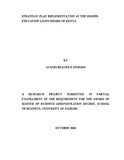| dc.description.abstract | David (2003), describe strategy implementation as a hard and time consuming but vital phase in strategic management. Thompson and Strickland (1990) view it as an interplay between several forces. There's no one best way of strategy implementation but HELB must successfully implement its strategic plans. This is because HELB occupies a strategic position in financing higher education in the country. Besides being a statutory requirement, the board has embraced strategic plan implementation as a management tool to enable it achieve its core objectives.
The study sought to find out how the board is implementing its strategic plans and the challenges encountered in its pursuit. Data was collected from senior management using an interview guide. The choice to interview this team was informed by the fact that they drive the formulation and implementation of the strategic plan thus considered rich in information relevant for the study. Secondary data was obtained from the HELB newsletters, brochures and HELB strategic plans. Content analysis was used to derive information from the collected data. It was found out that the implementation process though deemed demanding, the management is keen to see its success.
The findings from the study indicate that the implementation process was participatory. All staff are involved in the strategic plan implementation, management has taken upon itself to drive the process and to drum-up support from all staff for the same. Management is working on sensitizing all staff on the need to have the strategic plan as a living and operational document and to own it.
It was further revealed from the findings that the challenges noted as inhibiting the strategic plan implementation include limited financial resources, resistance to change, incapacitation in terms of infrastructure, technology, organizational structure and skills. A broader picture of the challenges the board faces are a projection of what the future holds for the organization. Pertinent factors such as government regulation including the threat that some courses may not be financed raises possibilities of alternative financing.
More concerns that precipitate the challenges the board is facing include the new constitution which emphasizes on access to basic education. This with the advent of the East African community put the board on notice to reassess its capabilities. Further, the thousands of students not being financed by the board though they are eligible provide a ready market for any organization that can accommodate them, threatening the position of the board. These call for regular reviewing of the strategic plan to make sure it keeps pace with the emerging trends and its successful implementation is crucial.
The study findings reveal a link and relationship with other studies on related subject carried out by other researchers. These include studies by Manyarkiy (2006), Ngumo (2006), Olali (2006) and Gesare (2006). They indicated that organizations pursuing strategy implementation faced various challenges, a factor confirmed by the findings of this study. This study enhanced their earlier findings by finding out the implementation process at HELB a factor many of these scholars did not look into.
The study was limited by the fact that the researcher having adopted a case study design makes it difficult to generalize the findings. The results of the analysis cannot be inferred to other organizations. The study was also limited by time. The researcher had to work within a limited time span and this meant that intense exposure to the subject variables
may have been constrained.
The study suggests that similar studies involving operational staff be carried out to get their insight regarding strategic plan implementation at HELB. This is because they are directly involved in execution. It would also be important to evaluate the effectiveness and efficiency of the implementation process against the set targets. This would give a clear picture of HELB achievement upon the lapse of the plan period. | en_US |

